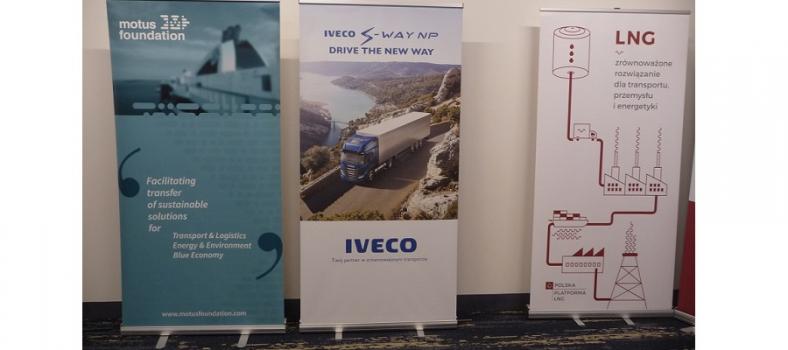
Over 80 participants gathered during this year’s Polish LNG Conference that took place in Arche Hotel Geologiczna on 28th November in Warsaw, Poland. This was the 3rd edition of the event, aimed at bringing together stakeholders from all corners of the LNG sector with a simple goal, exchange of knowledge and experiences that could be used to further propagate the LNG sector. This year’s event focused on an analysis of Poland’s role on the regional LNG scene, current advancements in the sector and future planned investments. However, as during previous editions of the conference, it stayed true to the tradition of international case studies presented by foreign delegates.
Polish LNG Conference 2019 event kicked off with a session presenting an overview of the LNG Market in Poland and Central Eastern Europe. Keynote speech was delivered by Jan Talaśka, DNV GL who presented a forecast for natural gas and the LNG market. During this presentation we had the opportunity to find out more about the predictions and future trends in fossil fuel use, primary energy supplies, and most importantly about the forecasts for the growing importance of LNG in use as a fuel and energy source. The session was continued by Marek Popiołek from the Ministry of State Assests, who presented the concepts of the Polish low-carbon transport fund its law regulation, and procedures related to the support provided by the fund. The session was closed by Tomasz Pietruszewski from the Polska Żegluga Morska (known as Polsteam), who presented an overview of the increasing role of LNG in the Polish market, and related infrastructure expansion and a growing number of received LNG deliveries along with future prognosis.
The second session begun with a presentation given by the main event sponsor DUON, represented by Dr Lech Wojciechowski, who introduced the challenges on the LNG market in heavy road transport in Poland. DUON’s presentation has shown a growing trend of LNG use in road transport, but also reminded us of an important problem that is Poland currently has an insufficient number of refueling stations. Followed by a presentation given by Maciej Marusiak, Emerson who explained the systems responsible for accounting of the quantity and energy of LNG. Next up two case studies have been presented, Henrik Domanovszky, Pannon Fuel presented the development of LNG station network on the example of Hungary, while Maik Rensing, LIQVIS GmbH introduced the opportunities and hurdles in development of LNG station network in Germany.
The central point of the conference focused around a discussion panel led by Jacek Nowakowski, IVECO, and four panelists representing DUON, Shell, Volvo and the Port of Gdynia. The leading topic was: The road to zero-emission transport. During the discussion the panelists talked about the future of fossil fuels, and how there is still a long way before they disappear, and about current solutions that allow to significantly reduce emissions such as LNG, Hydrogen and Emobility.
Following up on the discussion panel topic, next presentations in session 3 focused on low emission transport. Marcin Płocharski, Shell opened the session with a presentation focusing mainly on BioLNG as one of the important fuels leading to emission reduction in road transportation, presenting a strong case on the example of the BioLNG EuroNet – project consortium cofinanced from CEF funds. Next up was Ryszard Mrozek, IVECO who discussed the ecological and economic benefits of using LNG in road transportation, followed by a quick overview of hydrogen as the next step after LNG. The panel was closed by Tansu Destanoglu from UESTCO, who presented a case study of the Turkish LNG market & and technology in road transportation, showing the participants a different market perspective where LNG is manly used for power generation and industrial use, while remaining almost completely unused in transportation.
After presentations focusing on land transportation, attention of the participants was then switched to the topic of LNG in sea transportation. Maciej Krzesiński from the Port of Gdynia opened the session with a presentation exploring the challenges of LNG bunkering. Starting with challenges related to the specific location of the Port of Gdynia as it is a port built deeply into the City of Gdynia, following up with challenges related to legislative and safety regulations. Next Piotr Dowżenko, Remontowa LNG Systems, gave an overview of the LNG fuel systems used in the sea industry. And the session was closed by Krzysztof Czerski from Seatech Engineering, who explained ship bunkering methods and focused his presentation on the topic of bunkering ships,
The Conference was closed with a summary speech given by Emil Arolski, Chairman of Polish LNG Platform. Afterwards the guests have been invited to an evening networking cocktail.
The third edition of the Polish LNG Conference was organized by Polish LNG Platform with cooperation with Motus Foundation. The event was granted honorary patronage by the Polish Ministry of Infrastructure and Ministry of Maritime Economy and Inland Navigation. The general partner of the conference was DUON, other partners include IVECO, UESTCO, Emerson, Polska Żegluga Morska, BEST Systemy Grzewcze, translation was provided by Bireta.
The fourth edition of Polish LNG Conference is set to happen in fall of 2020.
Presentations from the Event:
2 Fundusz niskoemisyjnego transportu
4 Wyzwania na rynku lng w ciezkim transporcie samochodowym w polsce
5 Systemy do rozliczen ilosci oraz energii lng
6 Development of the lng station network example of hungary
7 The opportunities and hurdles in the development of the lng station network in Germany
8 Shell lng droga do zeroemisyjnego transportu
9 Alternatywne uklady napedowe
10 Contemporary Turkish lng market technology in road transportation
12 Paliwowe systemy lng w przemysle morskim 10 lat doswiadczen
13 Bunkierki lng specyfika jednostek


